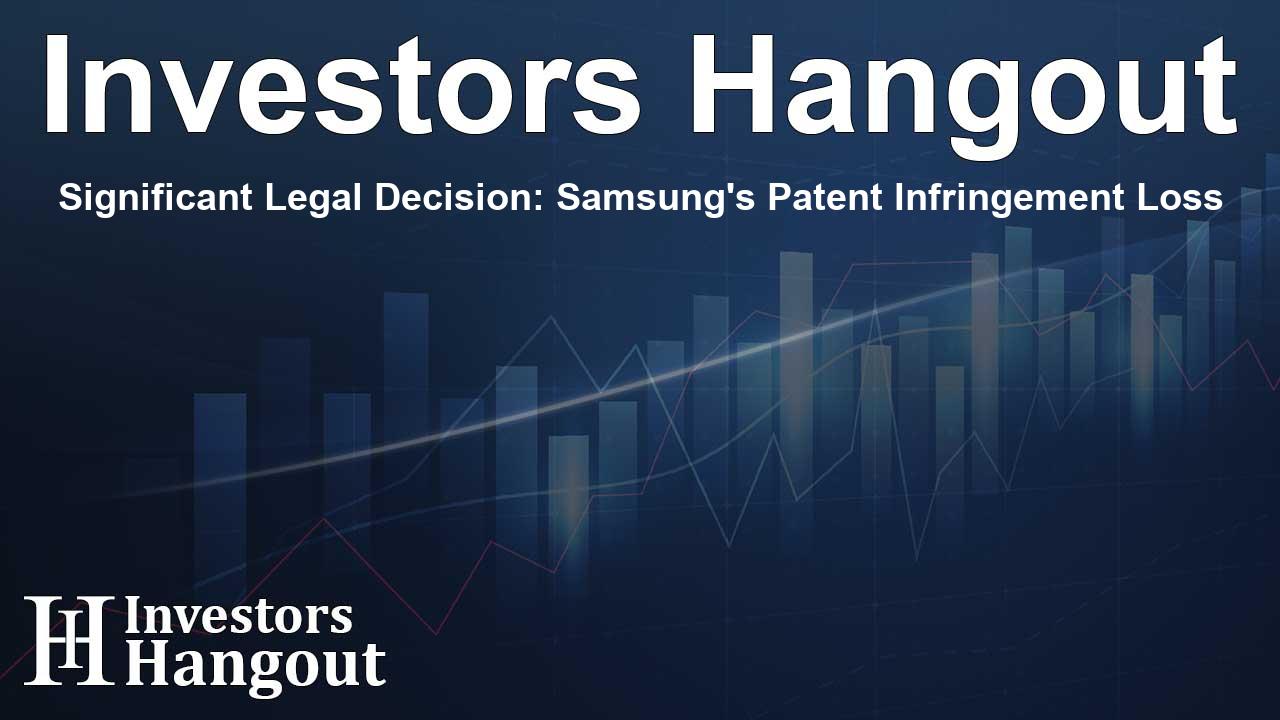Significant Legal Decision: Samsung's Patent Infringement Loss

Key Ruling in Patent Infringement Case Against Samsung
A recent ruling by a federal jury has opened new chapters in the high-stakes world of technology patents. In a courtroom in Marshall, Texas, Samsung Electronics faced a significant loss as it was ordered to compensate Netlist, a computer memory company, with $118 million. This verdict stems from allegations that Samsung's memory products infringed upon patents held by Netlist, which pertains to technology aimed at enhancing data processing capabilities in high-performance memory systems.
Background of the Case
Netlist, a company based in Irvine, California, previously triumphed in a related patent litigation against Samsung, where they claimed that Samsung's products infringe on their innovations. This recent verdict is not isolated; it follows a $303 million judgment awarded to Netlist last year in a preceding case involving similar accusations against Samsung.
Details of the Patent Infringement
The jury's decision underscores the complex nature of patent agreements in the technology sector. Netlist contended that its patented technology is crucial for improving the efficiency of memory modules, essential in various applications, including cloud computing and data analysis. Their technology aims to empower users by enabling faster data retrieval from extensive information sets.
Reactions and Future Implications
While both Samsung and Netlist's representatives have so far remained silent regarding the jury's findings, the implications of this ruling could be monumental. The jury not only found Samsung liable but also determined that the infringement was willful. This aspect of the verdict suggests that the damages awarded could potentially triple, as judges often consider willfulness a reason to increase penalties for patent infringement.
Samsung's Response
Samsung has been quick to contest these allegations, asserting that Netlist's patents are, in fact, invalid and that their technology functions differently than what is outlined in Netlist's claims. This defense encapsulates a broader theme in the tech industry, where companies often find themselves entangled in legal disputes over intellectual property.
Related Legal Developments
Moreover, Samsung has not only faced challenges from Netlist but has also initiated a separate lawsuit in Delaware. In this action, Samsung accuses Netlist of failing to honor commitments to provide fair licensing agreements for technologies critical to adhering to international standards. This ongoing legal tussle adds layers of complexity to the corporate dynamics between these two technology firms.
Industry Reactions
The outcome of such high-profile patent cases does not just affect the parties involved; they have far-reaching repercussions across the tech industry. As technology firms innovate and develop new solutions, understanding the boundaries of patent law becomes increasingly vital. Companies now more than ever must navigate the intricate landscape of patents to protect their innovations while respecting the rights of others.
Conclusion
With the tech industry's fast-paced evolution, legal issues tied to patents are expected to rise. The substantial ruling in favor of Netlist serves as a reminder of the critical nature of intellectual property rights to the ongoing development of technology. As this case unfolds, it will likely influence how tech giants approach future innovations and their licensing strategies.
Frequently Asked Questions
What was the outcome of the court ruling against Samsung?
The court ruled that Samsung must pay Netlist $118 million for patent infringement, with the potential for damages to be tripled due to willfulness.
What technology is at the center of the lawsuit?
The lawsuit involves patents related to improving data processing in high-performance memory products, essential for cloud computing and data-intensive operations.
How has Samsung responded to the allegations?
Samsung has denied the allegations, claiming that Netlist's patents are invalid and asserting that their technology does not infringe these patents.
What other legal actions have taken place between Netlist and Samsung?
Netlist previously won a $303 million verdict against Samsung in a related case and Samsung has filed a separate lawsuit accusing Netlist of not providing fair licensing agreements.
What is the significance of this ruling for the tech industry?
This ruling highlights the importance of intellectual property rights in the tech industry and may influence how companies develop and license new technologies moving forward.
About The Author
Contact Caleb Price privately here. Or send an email with ATTN: Caleb Price as the subject to contact@investorshangout.com.
About Investors Hangout
Investors Hangout is a leading online stock forum for financial discussion and learning, offering a wide range of free tools and resources. It draws in traders of all levels, who exchange market knowledge, investigate trading tactics, and keep an eye on industry developments in real time. Featuring financial articles, stock message boards, quotes, charts, company profiles, and live news updates. Through cooperative learning and a wealth of informational resources, it helps users from novices creating their first portfolios to experts honing their techniques. Join Investors Hangout today: https://investorshangout.com/
The content of this article is based on factual, publicly available information and does not represent legal, financial, or investment advice. Investors Hangout does not offer financial advice, and the author is not a licensed financial advisor. Consult a qualified advisor before making any financial or investment decisions based on this article. This article should not be considered advice to purchase, sell, or hold any securities or other investments. If any of the material provided here is inaccurate, please contact us for corrections.
